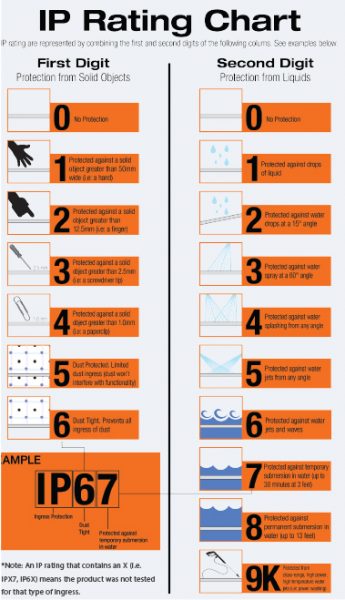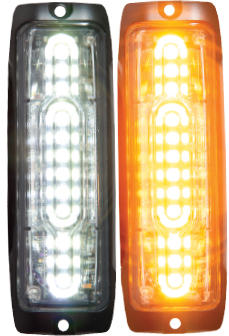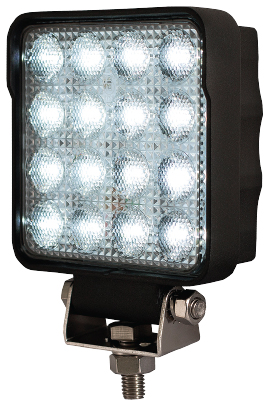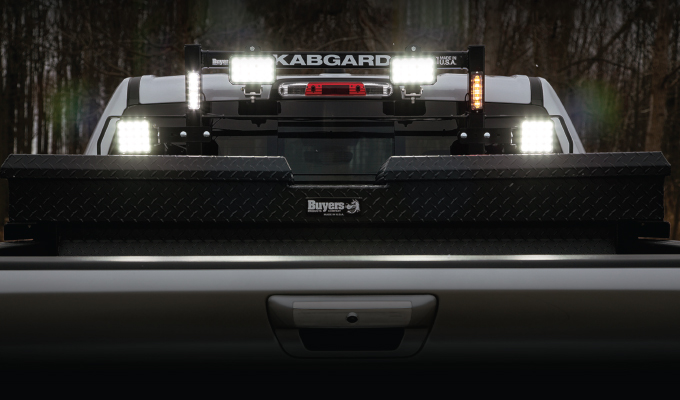 There are a lot of factors to consider when shopping for new lights for your truck—what type of light you need, where it will be positioned, its brightness, etc. There are hundreds of different lights on the market, and sorting through them can be daunting. A common spec you are likely to see pop up over and over as you shop is the light’s IP Rating. This can tell you at a glance if a light is tough enough to suit your needs, but it’s not always clear what the different ratings actually mean. Let’s break it down.
There are a lot of factors to consider when shopping for new lights for your truck—what type of light you need, where it will be positioned, its brightness, etc. There are hundreds of different lights on the market, and sorting through them can be daunting. A common spec you are likely to see pop up over and over as you shop is the light’s IP Rating. This can tell you at a glance if a light is tough enough to suit your needs, but it’s not always clear what the different ratings actually mean. Let’s break it down.
IP RATINGS EXPLAINED
Your trucks work hard, and over time they’re bound to take a beating from the elements. There’s nothing worse than having your equipment give out when you’re in the middle of a job. Whether it’s snow, rain, or blowing sand, you want to be sure that your lights can handle it all. To that end, the National Electrical Manufacturers Association (NEMA) developed IP Ratings to represent how protected the piece of equipment’s enclosure is against ingress from solids and liquids (“IP” actually stands for “Ingress Protection”).
Although we’re focused on lights, IP ratings are used for all types of electrical equipment (winches, backup cameras, etc.). An IP Rating looks like this: IP65.
The first digit represents the light enclosure’s ability to keep out solid objects. This includes everything from large objects (hands, tools, etc.) to very small ones like dust and sand particles. The higher the number, the better the light is sealed.
The second digit is protection from water and other liquids. Again, higher numbers mean a sturdier light.
Lights and other IP-rated equipment are put through a gauntlet of tests to ensure they live up to the claim. Josh Tucker, lead test engineer at Buyers Products, says, “Every light that comes through my door goes through the ringer. I’ll put it underwater, blast it with a high pressure hose, and leave it in -40-degree F conditions for hours. If the light makes it through my tests, I know it’s good enough for our customers.”
WHICH RATING?

For most work truck applications, a light with an IP65 or IP67 rating is a good target. They’re built to withstand frequent exposure to all sorts of weather conditions, so you can count on them even when you’re out in a blizzard or torrential downpour. You don’t need to worry about dust or sand either, which is good peace of mind when you’re at a jobsite with a lot of dirt in the air.
If you power wash your vehicle, you may want to bump up to an IP69K-rated light. An IP69K light is basically a fortress and can take the intense heat and pressure without issue. This makes it fantastic for dump trucks and other applications that are likely to go through hardcore cleanings on a regular basis.
“Whether it’s a work light, strobe, or DOT, an IP67 rating is totally sufficient for the daily trials of most work trucks,” Tucker says. “Unless the truck is frequently exposed to high pressure jets, the consumer will do well with an IP67-rated light.”
There’s nothing more frustrating than buying new tech that breaks the first time you use it in the field. Next time you’re in the market for a light, backup camera, or other piece of electrical truck equipment, be sure that the IP rating is right for your application.
 ABOUT THE AUTHOR
ABOUT THE AUTHOR
Ryan Eichhorn, product manager of lighting at Buyers Products, is responsible for the expansive catalog of lights at Buyers Products. His years of experience and knowledge help Buyers stay on top of the newest trends and innovations in the world of lighting. Find out more, visit www.buyersproducts.com.




